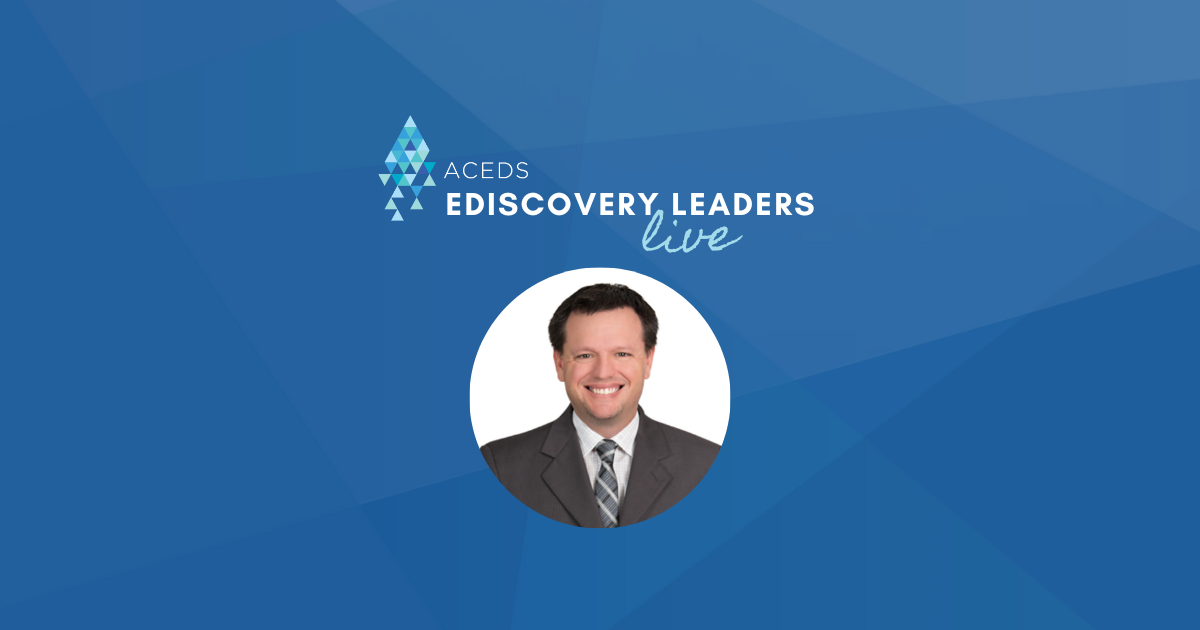eDiscovery Leaders Live: Adam Wehler of Robinson, Bradshaw, & Hinson
Adam Wehler, Director of Practice Support at Robinson, Bradshaw & Hinson, P.A., joins George Socha, Senior Vice President of Brand Awareness at Reveal, for ACEDS #eDiscoveryLeadersLive.
Adam Wehler is the director of practice support at Robinson Bradshaw. He is a resource for the firm’s lawyers on discovery-related issues ranging from collection to destruction of documents. He is also actively involved in the information governance support within the firm. Adam focuses on client discovery, whether local or worldwide, and strives to make sure everyone understands all the nuances that e-discovery can hold. Passionate about discovering more efficient ways to provide legal technology consulting, information governance and knowledge management, Adam has been working in the legal technology space for over 18 years. Today, as he works on building a legal operations group within a law firm, his goal is to allow for better alignment and communication between the firm’s clients’ team and the law firm.
Adam focused on what makes his firm different – and better – starting with the unusual practice of having no billing requirements. From there he discussed the myriad ways they use legal technology to give themselves an edge, then shared details on the firm’s practice support group and how they operation. Adam talked about how they work with clients, projects they have taken on, and their use of AI. With respect to AI, he discussed its use not just for litigation but in others areas, offering examples from the transactional side and discussing the value offered by emerging capabilities such as high precision classification. Adam closed with thoughts on getting effective use of these capabilities, getting buy-in from clients, and the role of trust throughout.
Key Highlights
- [2:22] What Robinson Bradshaw does differently.
- [3:44] No billing requirement at the firm – and why.
- [4:30] Legal tech: like clubs in a golf bag.
- [5:16] How that plays out in practice.
- [6:46] His legal technology theory of everything.
- [9:20] The size and scope of their practice support group, their goals and how they operate.
- [11:45] How they work with the firm’s clients and some of the projects they have taken on.
- [13:21] Examples from the transactional side.
- [14:37] Assessing and using AI.
- [16:27] Exploring new uses for AI.
- [17:29] His take on high precision classification and the value it offers for litigation, contract analysis, transactional work, and knowledge management.
- [20:46] How to get their lawyers, paralegals, and others to make effective use of AI and similar tools.
- [23:29] Getting buy-in from clients.
- [25:31] The importance of trust.
- [27:29] How they charge clients for the use of technology.
- [28:50] His second biggest win: tracking data.
Key Quotes
- “The point [of no billing requirements] is to get the work done in the best amount of time for the client… We get the work done efficiently and that’s what really brings us to apply the right technology.”
- “The great thing here, I think, is what I like to call my ‘theory of everything’… Let’s combine and not silo technology to ‘that’s a litigation tool’, ‘that’s a transactional tool.’ Let’s make it ‘that’s a legal technology tool’.”
- “You have to really pay attention to the people you are talking with, what their issues are. You need to surround solving that issue with a process. And that can allow you the ability to pick the best piece of technology.”
- “At the end of the day, when I look at AI, when I look at all of the different types out there, it does not seem as daunting because I know that its just algorithms…. Something I tell attorneys: you can’t be scared of AI because you [already] use it on a daily basis.”
- “One of the things I am excited about Reveal is you all bring in your tool the idea to pull out portions of the document and so theoretically I could train your tool to be a great diligence tool because I can pull out those parts of the document that contracts need.”
- “Tracking data from inception to close is something that I feel allows our department to be uniquely powerful and able to move…. You can only be as good as knowing where your data is.”
